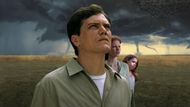If Die, My Love gave you whiplash with its intense investigation of mental illness, emotional loneliness, and unvarnished female fury, you're not alone. This haunting story digs into the id, leaving the reader with a residue of hopelessness, loveliness, and discomfiting closeness.
For readers attracted by its unsettling realism and poetic fragments, the desire for more stories that explore such emotional ground is bound to follow.
But discovering a good psychological thriller isn't much about checking boxes of suspense and drama. It is searching out films that dare to explore the uncomfortable, those that scurry underneath the veneer of regular life and reveal the weakness of the human psyche. These tales don't yell for attention; they unravel haltingly, seductively, and even brutally, just like Die, My Love.
The next seven movies are not your standard thrillers. They're disturbing, emotionally charged, and frequently bathed in the surreal. All of them echo Die, My Love's same nerve through themes of trauma, identity, psychological repression, or maternal stress. Get ready to question reality, morality, and yourself as you enter these unforgettable film realms.
Psychological thrillers, if you loved Die, My Love
1. Swallow (2019)

Swallow ventures into the hushed horrors of control and psychological oppression. Haley Bennett gives a mesmerizing performance as a housewife afflicted with pica - an urge to swallow hazardous things. Swallow's pastel-perfect visuals conceal a roiling inner crisis, much as Die, My Love.
What is different about Swallow is how it converts trauma into physical uprising, something handled so rarely with such moderation. Director Carlo Mirabella-Davis drew inspiration from his grandmother's life, lending the narrative an air of reality. The climax doesn't merely surprise; freedom follows. If you enjoyed Die, My Love's brutal intensity, Swallow is its visual and emotional doppelganger.
2. Black Swan (2010)

Darren Aronofsky's Black Swan is not just a ballet thriller, it's an anatomy of ambition, identity, and madness. Natalie Portman's Oscar-winning performance as Nina, a ballerina disintegrating under the pressure, echoes Die, My Love's subject of psychological breakdown behind a facade of elegance. The blurring of fact and fantasy makes each mirror a menace.
Aronofsky employs bodily transmutation to signify mental breakdown, making for a gruesome experience. In a fascinating twist, the role stretched Portman to her physical limits. She learned ballet for a year. For beauty with a hint of madness, Black Swan will leave you haunted yet breathless.
3. Take Shelter (2011)

Take Shelter lives off vagueness; is Curtis glimpsing the future, or is he falling into madness? Michael Shannon's performance as a man tormented by visions of the apocalypse is unnerving and profoundly sympathetic. As with Die, My Love, this movie asks what occurs when the mind is a tempest you cannot flee.
Based on his own anxiety disorder, director Jeff Nichols crafted Curtis. The film is anchored in real terror. The gradual build of terror with Jessica Chastain's realistic acting provides emotional realism. That conclusion? It fuels debates to this very day. Take Shelter does not scream; it quakes, and that is what makes it unforgettably great.
4. The Babadook (2014)

Grief is the monstrous form in The Babadook, a movie that shrouds maternal trauma in horror. Jennifer Kent's feature debut employs the villain of children's books as a metaphor for unspoken grief, just as Die, My Love unleashes anger through poetic disintegration.
Essie Davis gives a tour-de-force performance as a mother descending into chaos with loss. But this is what's interesting. Kent turned down Hollywood's invitations for sequels, keeping the film's integrity intact. They critique The Babadook today from feminist and LGBTQ+ perspectives, and in doing so, layer its legacy. Watch it, then linger in its silence.
5. Melancholia (2011)

Lars von Trier's Melancholia is psychological apocalyptic cinema. Kirsten Dunst's performance as Justine, a woman crippled by depression as a planet hurtles toward Earth, is heartbreaking in its accuracy.
What makes this movie work for fans of Die, My Love is how it recontextualizes mental illness not as weakness, but as clarity in chaos. Von Trier, himself a depression survivor, scripted the movie in a personal crisis, making each frame exquisitely honest. The two-part plot structure, the wedding and the end of the world, is a reflection of emotional duality. Melancholia does not inquire whether you will live through the end. It inquires whether you even care. It is hauntingly beautiful.
6. We Need to Talk About Kevin (2011)

This movie addresses the more sinister aspects of motherhood with unflinching strength. Tilda Swinton's Eva is not merely a bereaved mom. She's a woman struggling with guilt, public censure, and terror at never having connected with her child.
Inspired by Lionel Shriver's book, the movie fulfills Die, My Love's most significant question: What if love is insufficient? Swinton referred to this as her most emotionally draining role, and it is evident in every haunted gaze. Kevin is not the only mystery Eva is as well. This film stays with you like an unexplained wound.
7. Martha Marcy May Marlene (2011)

Elizabeth Olsen's breakout role as a cult fugitive in Martha Marcy May Marlene is tacitly chilling. The film's genius is in its editing, fusing past and present until both are equally perilous. Like Die, My Love, it transmits the psychological dissolution that comes after loneliness and trauma.
Olsen prepared for the part by reading actual survivor reports, infusing raw fragility onto the screen. Director Sean Durkin avoids dramatic crescendos; instead, tension creeps like a shadow. The ending refuses closure, echoing how trauma resists tidy narratives. If you’re drawn to psychological thrillers that whisper rather than scream, this one’s for you.
These seven psychological thrillers are not movies. They're immersive experiences that linger long after the credits stop rolling. Like Die, My Love, they force audiences to face unpleasant truths about the mind, identity, and emotional vulnerability. Through haunting images, fragmented timelines, or quietly heart-wrenching performances, each tale summons introspection and discomfort.
If you're attracted to filmmaking that probes the inner turmoil we tend to keep secret, these films are a must-see. They don't provide easy solutions, but they provide something less common - a genuine emotional connection. So, grab some blankets, turn down the lights, and get ready to be hauntingly moved.
Love movies? Try our Box Office Game and Movie Grid Game to test your film knowledge and have some fun!
